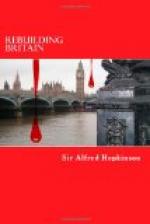We might venture to ask, indeed, the following questions: (i) Has not the Treasury during the last ten years lost a large portion of its control, and since the War almost its whole control over expenditure on a large scale? (ii) Is the Treasury not more concerned with paltry details than in imposing any real check on the extravagance of spending departments? (iii) Has not the policy sometimes been actually to encourage expenditure, and has not there been one case at least, even of introducing vexatious taxation where the amount collected is far less than the cost of collection? (iv) What has the Treasury done to prevent or control “the orgy of extravagance” since the War began? The department of State which has to do with revenue, with getting as much as possible and spending only what is necessary, which has the duty of “making both ends meet,” ought to resume its functions and regain its influence so that the Government may be conducted “on strict business principles,” to use Professor Lowell’s phrase, “as it was throughout a great part of the nineteenth century.”
(3) The Cabinet should exercise more controlling power, and recognise its collective responsibility for keeping down expenditure. As Professor Lowell points out, the position of the Chancellor of the Exchequer in the Cabinet was one of almost commanding influence. In Mr. Gladstone’s time his powerful personality, regularly exercised in favour of national economy, did certainly have a great effect in preventing extravagance, and some other Chancellors of the Exchequer no doubt used an influence in that direction, but can it be safely asserted that there is in the Cabinet as a whole sufficient attention given to retrenchment?
(4) Lastly, the House of Commons is supposed to control expenditure. That control has generally been used, and quite rightly, as a means of calling attention to grievances, and as giving an opportunity for criticism of the executive; but the House of Commons should also put pressure on the executive to curtail expenditure, not so much by discussing small details which would be far better dealt with by such a small Estimates Examination Committee as suggested, but by using its influence generally against an increase of expenditure unless a clear case for it is made out. During the War, Parliamentary control, at least until the appointment of the Committee above mentioned, seems almost to have gone. The House of Commons does not now exercise its influence as it ought, to check extravagance, and probably the more widely the electorate is extended, as already said, the less will the House of Commons care to exercise rigid control in favour of economy. It is always an easy way of getting popularity to be what is called “generous” when dealing with other people’s money. Everyone who looks after the public interest by trying to prevent expenditure, whether national or local, which is not imperatively called for, is styled mean and narrow-minded, and his task is a thankless one.




